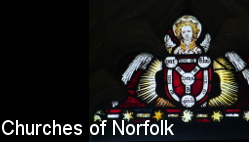| |
Abbey
church of St Mary, North Creake
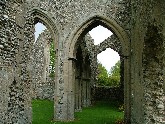 |
|
When
you look at 18th century engravings of abbey
ruins, they are either hauntingly wild
evocations, full of stormy drama, or else they
are simple domestic scenes, everyday agricultural
life being played out among the broken fleshless
bones of a past completely beyond the
comprehension of those who inhabit the picture.
In the 20th century we have, I am afraid, not
only understood these ruins, but tamed them and
made them safe. Never mind. For what
remains will always attract the casual visitor in
a way that a working abbey never would, allowing
us to wander and wonder, replaying in our heads
what might have happened here, a sense of the
glory that once was ours.
|
Creake
Abbey is on the southern edge of the Burnhams, a mile or
so from Burnham Thorpe, and heading here from there was a
little like crossing a boundary, as if this was the real
Norfolk at last.
What we
have here is a great church, enough of its walls
remaining to interpret it and imagine the rest. It was
built towards the end of the 1300s for an Augustinian
Priory which had inhabited this spot since the 1220s,
becoming an Abbey shortly afterwards. You enter the ruins
through the west door, and ahead are the massive piers of
the crossing, the transepts leading into chapels facing
east, all entirely discernible. Generally, the further
east you go the more complete the walls are, and even the
piscinas survive in the chapels. The springing to arches
hangs crazily above, the supporting piers gone.
Creake
Abbey is unusual, because although it survived into
the16th century, it never suffered the effects of the
Reformation or the dissolution of the monasteries. In
1508, an outbreak of plague killed virtually all the
inhabitants, and it was abandoned. In time, the buildings
and land were given to Christ's College, Cambridge.
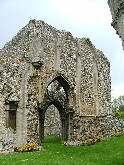 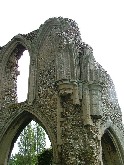 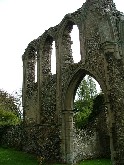
Creake
Abbey was the first place that I encountered two young
cyclists, and we crossed each others' paths as the day
went on. I rather feared they might think I was stalking
them, until one of the women pointed out that they might
just as well have been following me, which was sweet. I
felt rather sorry for them, because the bright sunshine
of the day was punctuated by thunderous downpours of
hail, one of which set in as I was exploring the ruins.
As it dispersed we left, and in brilliant sunshine headed
on to North Creake church.
Simon Knott, May 2005
|
|
